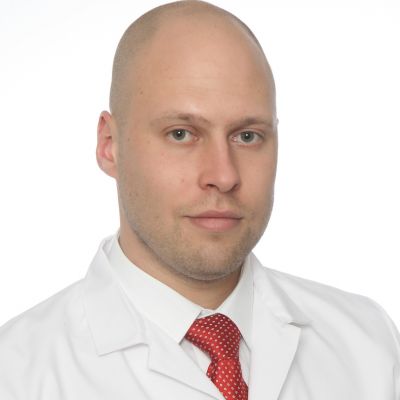Neurosurgeon, vertebrologist

Education and work experience:
- 2019 – Pauls Stradiņš Clinical University Hospital, Clinic of Neurosurgery, neurosurgeon;
- 2019 – Certificate of neurosurgeon obtained;
- 2019 – Jugla Clinic, branch of SIA Veselības centrs 4, neurosurgeon;
- 2013–2019 – University of Latvia, residency in neurosurgery of the Faculty of Postgraduate Education;
- 2013–2019 – Pauls Stradiņš Clinical University Hospital, Clinic of Neurosurgery, resident physician in neurosurgery;
- 2016–2019 – Jugla Clinic, branch of SIA Veselības centrs 4, resident physician in neurosurgery;
- 2014 – Jelgava City Hospital, surgeon on duty;
- Member of the Latvian Association of Neurosurgeons;
- Participates in various courses, seminars, conferences and congresses in Latvia and abroad on a regular basis.
Vertebrology is a sub-discipline of neurosurgery – the study of the vertebral column and its diseases. Severe headaches, stiff and/or aching back, pain when standing up or bending down – these are just some of the symptoms associated with diseases of the spinal column that can indicate the development of osteochondrosis, radiculitis, spinal deformity and other more serious conditions such as scoliosis, intervertebral disc herniation, etc. Such symptoms suggest the need to consult a neurosurgeon vertebrologist.
Many people now have issues with their spine, and sedentary lifestyles and sedentary work contribute to their development. Early diagnosis and treatment of spinal diseases by a neurosurgeon–vertebrologist is the basis for effective and speedy recovery. You should consult a neurosurgeon–vertebrologist to prevent the development of spinal conditions in due time.
A neurosurgeon-vertebrologist can help in case of the following diseases or symptoms:
- pain in the neck, chest, lumbar region of the back;
- pain in the back irradiating in the legs or arms;
- in case of brain and spinal cord injury (loss of consciousness, noise in the ears, impaired coordination, headache and impaired perception of information);
- trigeminal neuralgia (pain, inflammation) – neurovascular conflict;
- brain haemorrhages;
- idiopathic intracranial hypertension;
- blood vessel clots which can result in stroke;
- vascular masses of the brain (aneurysms, arteriovenous malformations, cavernomas, angiomas);
- brain tumours (gliomas, glioblastomas);
- pituitary adenoma (tumour);
- tumours of the meninges (meningiomas);
- tumours, masses of the spinal cord or spinal cord meninges;
- acoustic neuromas (Schwannomas);
- neuralgia;
- intervertebral disk herniation;
- numbness of the hands;
- peripheral neuralgia;
- carpal tunnel syndrome;
- normal pressure hydrocephalus, occlusive hydrocephalus, communicating hydrocephalus;
- compression neuropathies: nerve compression syndromes, carpal tunnel, cubital (elbow) tunnel and other nerve compression syndromes.
Offers consultations in Latvian, Russian and English.
